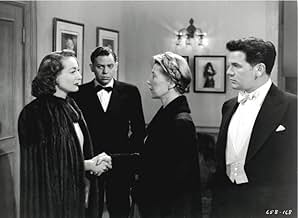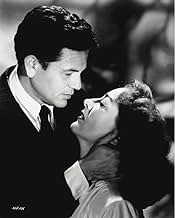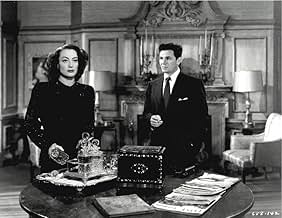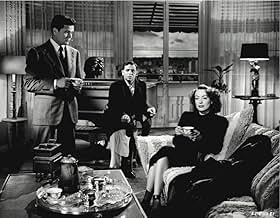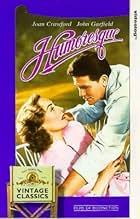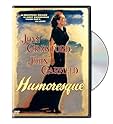Humoresque
- 1946
- Tous publics
- 2h 5m
IMDb RATING
7.3/10
5.1K
YOUR RATING
A classical musician from the slums is sidetracked by his love for a wealthy, neurotic socialite.A classical musician from the slums is sidetracked by his love for a wealthy, neurotic socialite.A classical musician from the slums is sidetracked by his love for a wealthy, neurotic socialite.
- Director
- Writers
- Stars
- Nominated for 1 Oscar
- 4 wins & 1 nomination total
Robert Blake
- Paul Boray (as a Child)
- (as Bobby Blake)
Peg La Centra
- Night Club Singer
- (as Peg LaCentra)
- Director
- Writers
- All cast & crew
- Production, box office & more at IMDbPro
Featured reviews
There were two primary reasons for wanting to see 'Humoresque'. One was the cast, am especially an admirer of Joan Crawford. Considered a screen legend for good reason. The other was the music, absolutely adore classical music and love it when a film has a healthy dose of it. The involvement of Franz Waxman, one of the best film composers at that time and fine arranger of music, and that it was performed by violinist Isaac Stern made me more excited.
'Humoresque' has plenty to get excited about. Not only is it a great film in its own right, but it is a fine example of how to do melodrama well and what it's all about. To me, 'Humoresque' is so well made, directed, written and acted, while also having some of the best use of classical music on film. Not quite masterpiece level but close, and quintessential Crawford in both films and performances. Fans of Jean Negolesco will love it too, it's towards one of his best, same goes for male lead John Garfield. Almost everything works.
My only criticism is the length, with the film being for my tastes a little overlong. A little trimming towards the end would have helped.
Crawford however is just astounding. An intensely powerful performance and one of her best, vintage prime-Crawford really. Garfield seldom gave a finer performance than here in 'Humoresque', don't think he ever was this intensely passionate and electric. They are magnetic together. Oscar Levant was ckearly having fun with some of the film's best lines in a tailor-made role that had elements of himself in, his wisecracking is hilarious and never felt out of place. Instead it stopped it from being too heavy-going. Robert Blake never resorts to trying to be too cute or being whiney. Ruth Nelson, J Carroll Naish and Joan Chandler (although Gina is too much of a plot device and a not explored enough one) are rock solid support, especially Nelson.
Negulesco brings his usual tautness and edge, but also sophistication and he doesn't let the film get too overwrought or cold. 'Humoresque' is a wonder visually, with some world class cinematography. The story seldom felt dull, despite lagging a bit towards the end, and doesn't get campy or overwrought. The very end is very powerful and moving. The script never stops being hugely entertaining, Levant has most of the best lines with his wisecracks and witticisms but another favourite was Crawford's line when reacting to being asked as to whether she liked classical music and her references to Ravel and Beethoven are very witty.
As well as the cast, the music is a huge part of 'Humoresque's' appeal. Waxman's scoring is unmistakably lush and swells with emotion, but even better is the classical music which is incredible. The pieces originally written for the violin are some of the finest written for the instrument, and the arrangements work so well one would think that they were originally intended for the violin namely the Carmen fantasie (which became a popular concert piece and still is). Stern plays the music brilliantly, making very virtuosic music (i.e. Sarasate) sound easy, but he is not the only musician here. Levant, an immensely talented pianist (well you'd have to be if you play Gershwin well), and Peg La Centra also heavily contribute and they are effective. Particularly coming off well are one of the to this day best versions of the Carmen fantasie and an immensely powerful version of "Liebestod".
Summing up, great film and a must for fans of Crawford, Garfield, Levant, Waxman, Stern, classical music and Negulesco. 9/10
'Humoresque' has plenty to get excited about. Not only is it a great film in its own right, but it is a fine example of how to do melodrama well and what it's all about. To me, 'Humoresque' is so well made, directed, written and acted, while also having some of the best use of classical music on film. Not quite masterpiece level but close, and quintessential Crawford in both films and performances. Fans of Jean Negolesco will love it too, it's towards one of his best, same goes for male lead John Garfield. Almost everything works.
My only criticism is the length, with the film being for my tastes a little overlong. A little trimming towards the end would have helped.
Crawford however is just astounding. An intensely powerful performance and one of her best, vintage prime-Crawford really. Garfield seldom gave a finer performance than here in 'Humoresque', don't think he ever was this intensely passionate and electric. They are magnetic together. Oscar Levant was ckearly having fun with some of the film's best lines in a tailor-made role that had elements of himself in, his wisecracking is hilarious and never felt out of place. Instead it stopped it from being too heavy-going. Robert Blake never resorts to trying to be too cute or being whiney. Ruth Nelson, J Carroll Naish and Joan Chandler (although Gina is too much of a plot device and a not explored enough one) are rock solid support, especially Nelson.
Negulesco brings his usual tautness and edge, but also sophistication and he doesn't let the film get too overwrought or cold. 'Humoresque' is a wonder visually, with some world class cinematography. The story seldom felt dull, despite lagging a bit towards the end, and doesn't get campy or overwrought. The very end is very powerful and moving. The script never stops being hugely entertaining, Levant has most of the best lines with his wisecracks and witticisms but another favourite was Crawford's line when reacting to being asked as to whether she liked classical music and her references to Ravel and Beethoven are very witty.
As well as the cast, the music is a huge part of 'Humoresque's' appeal. Waxman's scoring is unmistakably lush and swells with emotion, but even better is the classical music which is incredible. The pieces originally written for the violin are some of the finest written for the instrument, and the arrangements work so well one would think that they were originally intended for the violin namely the Carmen fantasie (which became a popular concert piece and still is). Stern plays the music brilliantly, making very virtuosic music (i.e. Sarasate) sound easy, but he is not the only musician here. Levant, an immensely talented pianist (well you'd have to be if you play Gershwin well), and Peg La Centra also heavily contribute and they are effective. Particularly coming off well are one of the to this day best versions of the Carmen fantasie and an immensely powerful version of "Liebestod".
Summing up, great film and a must for fans of Crawford, Garfield, Levant, Waxman, Stern, classical music and Negulesco. 9/10
Joan Crawford was midway through filming 'Humoresque' when she won her Oscar for 'Mildred Pierce'. Along with 'Possessed', I think these three are her finest performances--and the films themselves aren't bad either!
Here she is a sophisticated patron of the arts who falls hard for John Garfield, as a high-strung violinist. Her neurotic, possessive nature is hellbent on self-destruction--leading to the inevitable ending which, though a bit overly dramatic, is a stunning conclusion to an interesting romantic drama. Garfield and Crawford make a good team--though personally I liked his teaming with Lana Turner better in 'The Postman Always Rings Twice'.
Oscar Levant supplies some cynical comedy relief with dry humor. Franz Waxman's score permits use of other classical composers--Bizet, Rossini and Wagner--giving distinction to a well crafted, if overlong melodrama that showcases the star's glamourous image. Crawford never looked better with Bette Davis' favorite photographer, Ernie Haller, at the camera. Makes you wonder why they couldn't find stories like this for Crawford while she was at MGM.
Here she is a sophisticated patron of the arts who falls hard for John Garfield, as a high-strung violinist. Her neurotic, possessive nature is hellbent on self-destruction--leading to the inevitable ending which, though a bit overly dramatic, is a stunning conclusion to an interesting romantic drama. Garfield and Crawford make a good team--though personally I liked his teaming with Lana Turner better in 'The Postman Always Rings Twice'.
Oscar Levant supplies some cynical comedy relief with dry humor. Franz Waxman's score permits use of other classical composers--Bizet, Rossini and Wagner--giving distinction to a well crafted, if overlong melodrama that showcases the star's glamourous image. Crawford never looked better with Bette Davis' favorite photographer, Ernie Haller, at the camera. Makes you wonder why they couldn't find stories like this for Crawford while she was at MGM.
I was astounded by the virtuoso performance on the violin by John Garfield. I truly believed he was a multi talented man. I looked up IMDb and found out that they were using two doubles to actually play the violin. I am even more amazed that the two actual violinists by his side each played the bow and the strings separately. The effect was perfect to the viewers. The pieces selected were also of the type that could easily appeal to those whose knowledge and experience with western classical music is limited. Bravo Isaac Stern for this music. I am reminded of Fiddler on the Roof which also had this great violinist give us the pleasure of his performance. Oscar Levant is of course a pianist also and it is he who turned out to be multi talented.
It opens with a close up of John Garfield and that, already, gets you going. The intensity and power of the man. A from rags to riches tale with an extra something. The extra something here is Clifford Odetts, the language is as pungent as its pace. The truth in John Garfield's face rises everything several notches but, perhaps, the biggest surprise from a 2007's standpoint, is Joan Crawford's performance. She's never been one of my favorites, I always thought impossible to warm up to her and her tough lady from the wrong side of the tracks left me cold but here, she's rounded and brilliant, torn between who she is and who she would like to be. Great lines, fantastic close ups - wearing eye glasses, removing the glasses and squinting - At moments you feel the camera devours her. The director, Jean Negulesco - Three Coins In The Fountain, How To Marry a Millionaire - never flown this high. This 1946 Warners melodrama has the stuff that great works of art are made of. Thrilling
This movie is remarkably good in certain respects, disappointing in others, which may explain the wide range of scores and comments posted by previous reviewers on here.
To the positive:
1. The cinematography and lighting are often astounding. All those great closeups of Crawford, reminding you of silent movie camerawork. Perhaps the most interesting is at the start of Lalo's Rhapsodie espagnole, where it looks as if Paul Boray's playing is causing her to have an orgasm. Crawford and Garfield outlined against a setting sun is also wonderful. The list of the beautifully shot scenes is endless.
2. Crawford and Garfield's very fine, if very different, acting. She delivers her lines with breathless emotion, beautifully enunciated. He sticks to speaking like someone who grew up in a working-class New York neighborhood. (Some above found him unconvincing as a concert violinist because of his appearances as a tough guy in his previous movies. I found him very convincing. You shouldn't imagine that all classical musicians are fragile flowers. They aren't.) Both do a great deal with their faces in the endless closeups. Garfield really makes you believe not only that he is actually playing the violin in all those violin sequences. He makes you believe he is feeling every note and phrase. They are both a pleasure to watch.
3. The amount of well-performed classical music. We get large chunks, and sometimes even complete performances, of a lot of works. (For those who don't care for classical music, they can always watch the faces.)
4. The staging of the final beach scene. It's really remarkably put together. Though there are a few moments I could live without, such as the view of the seaweed under the ocean surface after a certain character walks into the sea.
To the negative:
1. The movie is too long for the story it tells. I still sit through the whole thing on a repeat viewing, but I wish it were shorter.
2. Oscar Levant's wisecracks, which delighted some previous viewers, get annoying after a while to me. They aren't all funny. Some of them could have been cut.
3. Both of the leads are, alternately, sympathetic and annoying. Crawford's Helen Wright can't understand why a professional musician wouldn't leave a rehearsal to see her. Garfield's Boray can't feel grateful to Helen for her help with his career. Etc. They are constantly getting on each other's nerves, sometimes for no good reason. Helen is an alcoholic, so that's probably realistic. Boray doesn't want to be beholden to anyone. But why?
This is not a movie I would watch frequently. But it is certainly a fine work of art, where the positives outweigh the negatives. If you haven't seen it and can focus on the cinematography and/or music, you will definitely enjoy it, despite its flaws.
To the positive:
1. The cinematography and lighting are often astounding. All those great closeups of Crawford, reminding you of silent movie camerawork. Perhaps the most interesting is at the start of Lalo's Rhapsodie espagnole, where it looks as if Paul Boray's playing is causing her to have an orgasm. Crawford and Garfield outlined against a setting sun is also wonderful. The list of the beautifully shot scenes is endless.
2. Crawford and Garfield's very fine, if very different, acting. She delivers her lines with breathless emotion, beautifully enunciated. He sticks to speaking like someone who grew up in a working-class New York neighborhood. (Some above found him unconvincing as a concert violinist because of his appearances as a tough guy in his previous movies. I found him very convincing. You shouldn't imagine that all classical musicians are fragile flowers. They aren't.) Both do a great deal with their faces in the endless closeups. Garfield really makes you believe not only that he is actually playing the violin in all those violin sequences. He makes you believe he is feeling every note and phrase. They are both a pleasure to watch.
3. The amount of well-performed classical music. We get large chunks, and sometimes even complete performances, of a lot of works. (For those who don't care for classical music, they can always watch the faces.)
4. The staging of the final beach scene. It's really remarkably put together. Though there are a few moments I could live without, such as the view of the seaweed under the ocean surface after a certain character walks into the sea.
To the negative:
1. The movie is too long for the story it tells. I still sit through the whole thing on a repeat viewing, but I wish it were shorter.
2. Oscar Levant's wisecracks, which delighted some previous viewers, get annoying after a while to me. They aren't all funny. Some of them could have been cut.
3. Both of the leads are, alternately, sympathetic and annoying. Crawford's Helen Wright can't understand why a professional musician wouldn't leave a rehearsal to see her. Garfield's Boray can't feel grateful to Helen for her help with his career. Etc. They are constantly getting on each other's nerves, sometimes for no good reason. Helen is an alcoholic, so that's probably realistic. Boray doesn't want to be beholden to anyone. But why?
This is not a movie I would watch frequently. But it is certainly a fine work of art, where the positives outweigh the negatives. If you haven't seen it and can focus on the cinematography and/or music, you will definitely enjoy it, despite its flaws.
Did you know
- TriviaJohn Garfield, a method actor, tried to obtain an emotional bond with the character Joan Crawford played by looking deeply into her eyes which very much unnerved Crawford, who told the director: "Tell him to stop looking at me!"
- GoofsIn the scene where Paul Boray is practicing on stage in his shirt sleeves, you can see the top of the head of a man crouched down behind him. This has to be one of the violinists who did the playing for John Garfield by reaching around him.
- Quotes
Sid Jeffers: It isn't what you are, it's what you don't become that hurts. Idealism is a luxury for the very young.
- Crazy creditsThe opening credits are presented on the turning pages of the sheet music for the composition "Humoresque".
- ConnectionsEdited into Les cadavres ne portent pas de costard (1982)
- How long is Humoresque?Powered by Alexa
Details
Box office
- Budget
- $2,164,000 (estimated)
- Runtime2 hours 5 minutes
- Color
- Aspect ratio
- 1.37 : 1
Contribute to this page
Suggest an edit or add missing content



